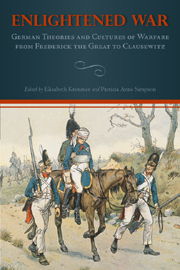Book contents
- Frontmatter
- Contents
- List of Illustrations
- Acknowledgments
- Introduction: Enlightened Warfare in Eighteenth-Century Germany
- Part I War and Enlightenment
- Part II Cultures of War in Classicism and Romanticism
- 3 Agamemnon on the Battlefield of Leipzig: Wilhelm von Humboldt on Ancient Warriors, Modern Heroes, and Bildung through War
- 4 War, Anecdotes, and the Backsides of Reason: Kleist with Kant
- 5 “Schon wieder Krieg! Der Kluge hörts nicht gern”: Goethe, Warfare, and Faust II
- 6 Recoding the Ethics of War in Grimms' Fairy Tales
- Part III War and Gender
- Part IV War and Theory
- Bibliography
- Notes on the Contributors
- Index
4 - War, Anecdotes, and the Backsides of Reason: Kleist with Kant
from Part II - Cultures of War in Classicism and Romanticism
Published online by Cambridge University Press: 05 February 2013
- Frontmatter
- Contents
- List of Illustrations
- Acknowledgments
- Introduction: Enlightened Warfare in Eighteenth-Century Germany
- Part I War and Enlightenment
- Part II Cultures of War in Classicism and Romanticism
- 3 Agamemnon on the Battlefield of Leipzig: Wilhelm von Humboldt on Ancient Warriors, Modern Heroes, and Bildung through War
- 4 War, Anecdotes, and the Backsides of Reason: Kleist with Kant
- 5 “Schon wieder Krieg! Der Kluge hörts nicht gern”: Goethe, Warfare, and Faust II
- 6 Recoding the Ethics of War in Grimms' Fairy Tales
- Part III War and Gender
- Part IV War and Theory
- Bibliography
- Notes on the Contributors
- Index
Summary
Prologue
THIS READING OF HEINRICH VON KLEIST is a reading of “backsides.” It recognizes the subversive, “inverted” forms of his literature and acknowledges contradictions and holes in his writing. It goes to the margins of German Classicism, to the no man's land of the Napoleonic Wars, and to the peripheries of Kant's philosophy. These are the sites in which Kleist stood as an officer, an author, and a critic; in these contexts, his writing appeared and vanished. His novels and plays are responses to the literary court of Weimar and are read as subversive interpretations of Goethe's work. From an “epistemological” point of view, his literature can be seen as a long remark on his Kant-Krise and as a prolonged struggle with the definitions of Enlightenment; his “misinterpretation” of Kant, however, opens perspectives on disasters in the realm of reason. In the political context, his work can be located as an appendix to Prussian militarism and the war with France. Herein lies the meaning of reading Kleist from the “back”: it is a reading that explores the subversive movement that governs his writing and studies the counter-movements, the movements of resistance and escape that characterize his war literature. In his writings Kleist declared war — war against Enlightenment and Classicism, but also war against war itself. His soldiers resist the conventional warfare of his age and often move on different, irregular, “inverted” paths of violence.
- Type
- Chapter
- Information
- Enlightened WarGerman Theories and Cultures of Warfare from Frederick the Great to Clausewitz, pp. 103 - 125Publisher: Boydell & BrewerPrint publication year: 2011

